Medeek Wall Plugin
-
Version 0.9.8g - 10.24.2018
- Corrected a bug in the Walls tab of the global settings involving the wall presets selection field.
- Added a blocking thickness parameter in the Walls tab of the global settings.
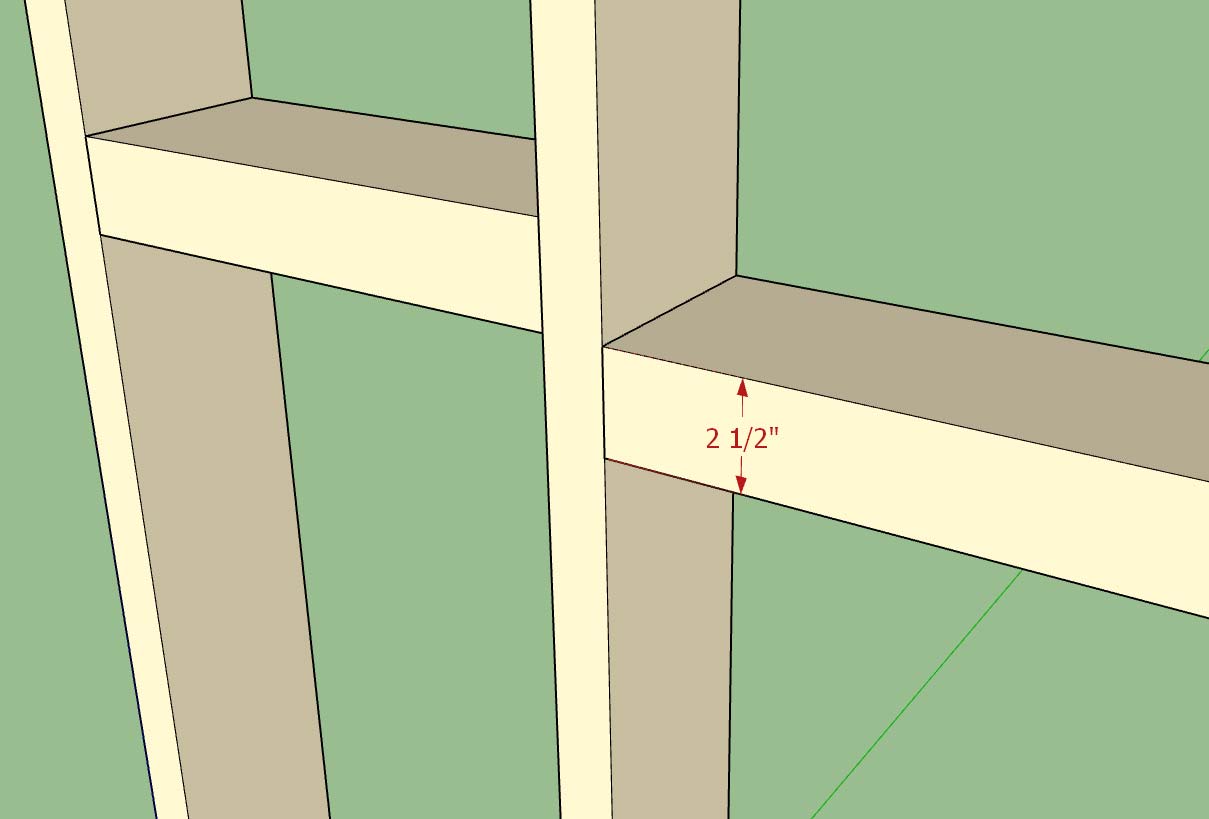
This particular bug in the Walls tab only became an issue when a previously selected default preset was deleted and then the user navigated to the Walls tab after the deletion.
Now the javascript checks first for the existence of the default preset before trying to assign it in the drop down menu.
Not a really big issue but in a certain state it will lock up the form and not allow the user to save their settings.
The blocking thickness parameter was a quick item to add per a user request. Note that this is a global default and cannot currently be adjusted per wall panel. If we need more granularity I can do that but it means an additional parameter in the attribute library of the wall panel which means it will break backward compatibility with previous versions of the plugin.
-
Medeek Wall Plugin Tutorial 5: Multi-Story Construction
View model here:
3D Warehouse
3D Warehouse is a website of searchable, pre-made 3D models that works seamlessly with SketchUp.
(3dwarehouse.sketchup.com)
-
Version 0.9.8h - 10.25.2018
- Fixed a bug with the blocking parameter for metric templates.
If your using metric templates you will want to upgrade to this version otherwise your blocking will appear too large as it will not be converted from millimetres to inches in the final drawing step.
A critical fix for clients using metric.
-
As a follow up discussion to the multi-story tutorial I was asked a question by a designer regarding installation of a band board between the two stories as shown below:
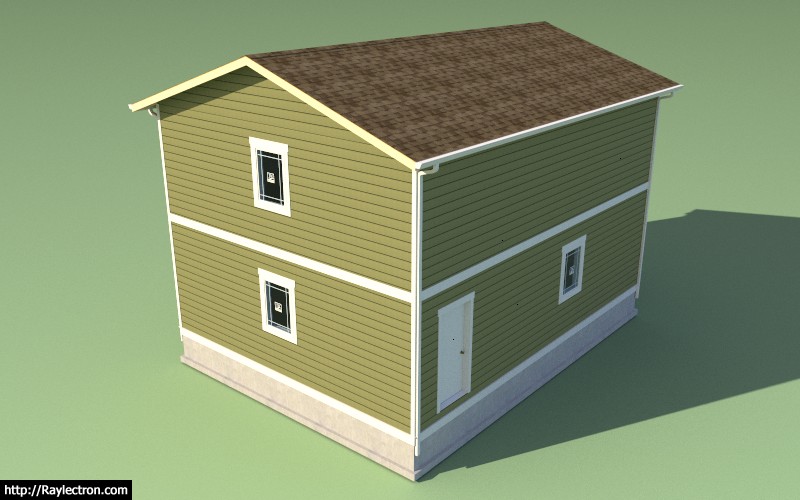
To be honest I hadn't tried this before but the band board is provided by the 1st level walls and then its height is actually set such that it is actually above the sheathing, cladding and wall height. It seems this is possible.
On the same token one could use the 2nd story walls to specify the band board and input a negative number to set the band board below the actual wall itself.
In this particular design case, there is more than one way to solve the problem.
The frieze and skirt boards are a little more static, in that they will always be positioned at the top and bottom of cladding respectively.
On a slightly different note you will notice that we are already at revision "h" of version 0.9.8:
Medeek Design Inc. - Medeek Wall Plugin Changelog
Medeek Design Inc. - Medeek Wall Plugin Changelog
(design.medeek.com)
Quite a few updates to this version. The reason I haven't rolled to 0.9.9 is because I am saving that version for the stair module roll out and then version 1.0.0 will be when I roll out the gable wall module.
At that point I will be taking the plugin out of BETA which in all reality means that I am then paying attention to backward compatibility issues and actively trying to maintain it so that new upgrades do not cause problems.
Version 1.0.0 also means that I will be further reviewing my pricing structure and my licensing system. There has been some pressure from various quarters to move to a subscription based licensing system even though I have resisted this move.
If I do move to a subscription system the good news is that all currently licensed users will be grandfathered in so that they will not be required to renew a yearly subscription, their licenses will always remain permanent.
As an incentive to encourage more early adopters I will be running a "Thanksgiving Promotion" on all of the plugins until Nov. 23 (Black Friday). For all plugins purchased between Oct. 15 thru Nov. 23 your typical two year license will be doubled to four years and your one year foundation plugin will be doubled to two years.
For those who have recently purchased any of the plugins please send me an email and I will honor this promotion by extending your license exp. date.
-
***** UPGRADE WARNING *****
One thing that has come to my attention is that when upgrading to the latest version of the plugin (0.9.8h) and you are upgrading from a previous version that did not have the new dimension layers (dim2 and dim3) added, you may encounter this error:
Error; #<TypeError; no implicit conversion from nil to integer> c;/users/dscott/appdata/roaming/sketchup/sketchup 2018/sketchup/plugins/medeek_wall_ext/medeek_wall_globals.rbs;1445;in `[]'The quick fix for this error is to reinitialize the layers by clicking on the global settings and then navigating to the Layers tab. This alone will reinitialize any missing or newly added layers.
In the next version I will add some additional code that checks for this type of situation, so that it is no longer an potential issue in future releases.
-
The next release of the plugin will have an arrow as shown to the right of the tabs in the global settings which will take the user to the next set of tabs:
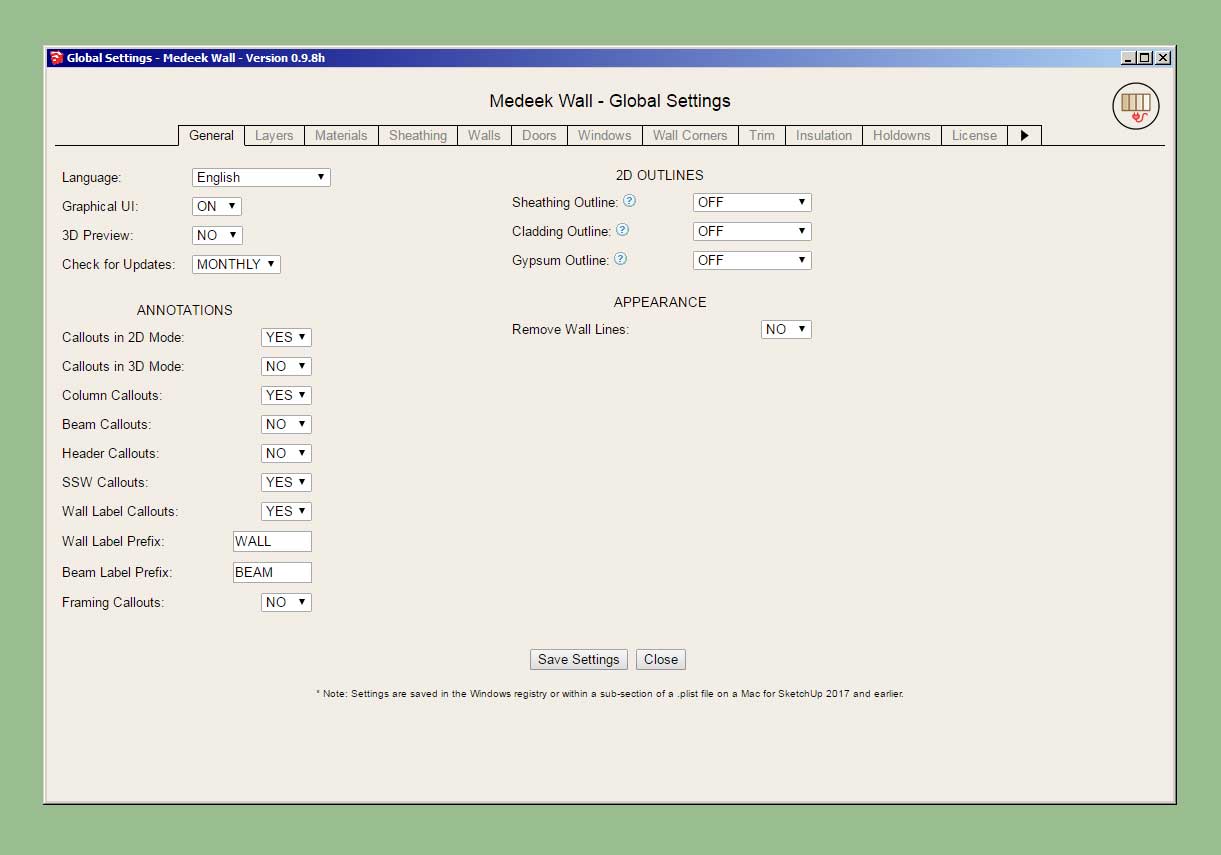
Currently there are nine new tabs planned, most of which will have an under construction sign until I fully flesh them out:
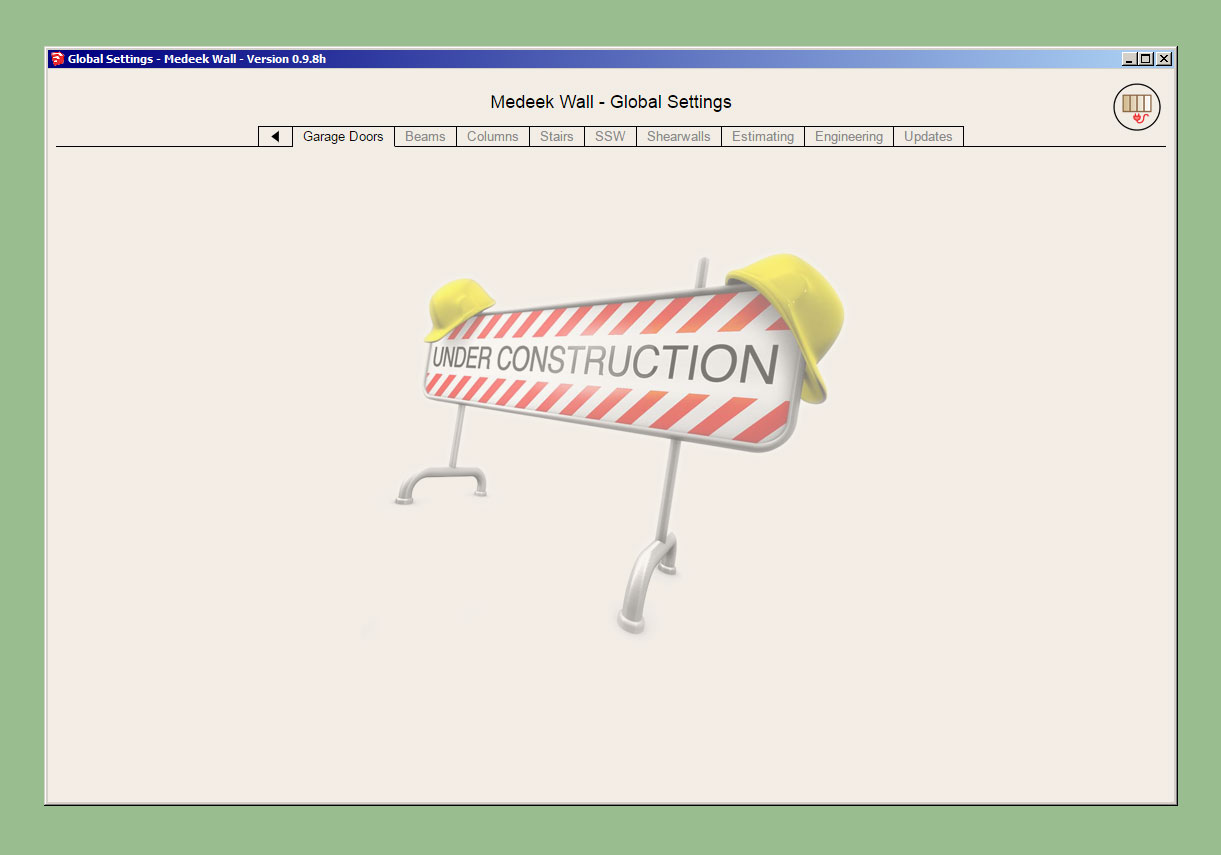
The Updates tab will display the current changlog which is paralleled on the website as well.
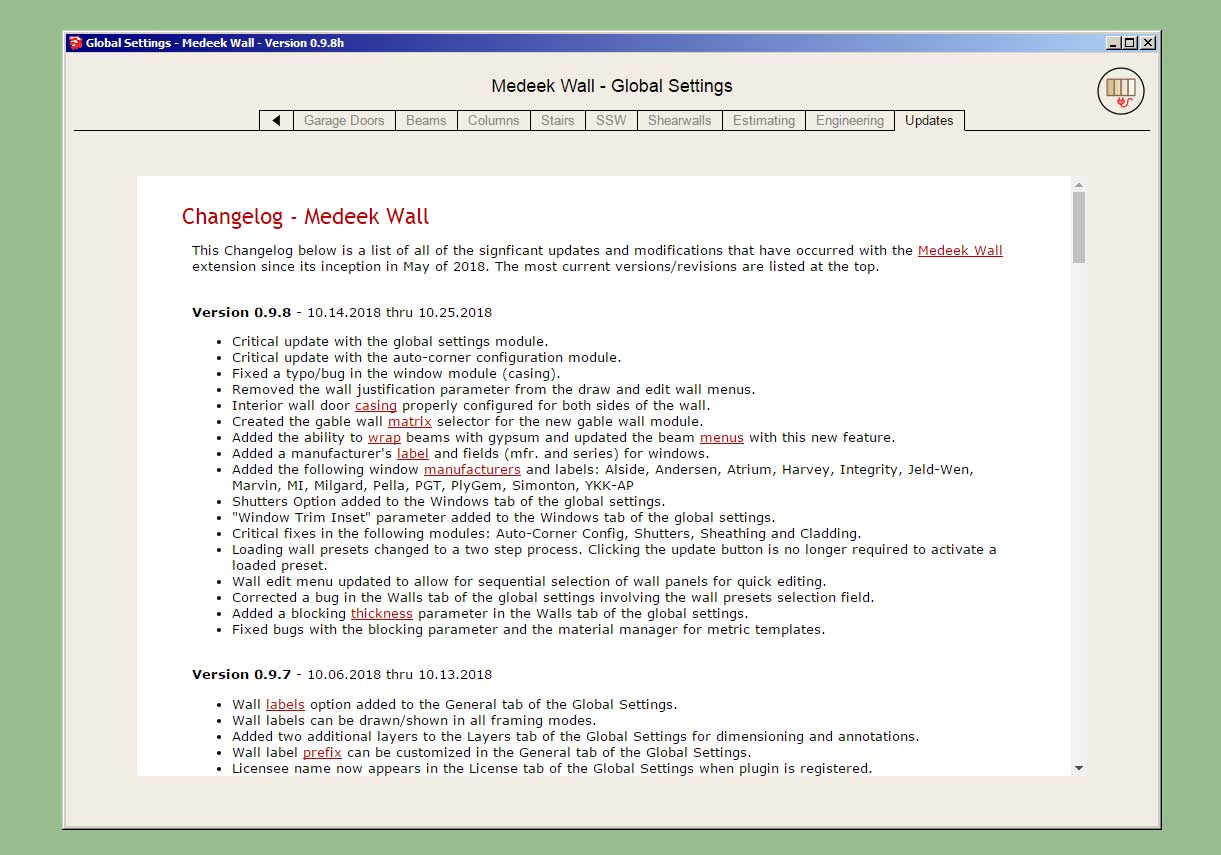
Clicking the left arrow will return the user back to the first set of tabs.
If required an additional right arrow can be added to the second set of tabs taking the user to the third set of tabs.
In total there are 12 tabs in the first set and 9 tabs in the second set, for a total of 21 tabs in the global settings.
-
Version 0.9.8i - 10.28.2018
- The following tabs added to the global settings: Garage Doors, Beams, Columns, Stairs, SSW, Shearwalls, Estimating, Engineering and Updates.
- Enabled custom materials for gypsum in the HTML wall draw and edit menus.
- Felt + OSB material added to the pre-installed plugin materials.
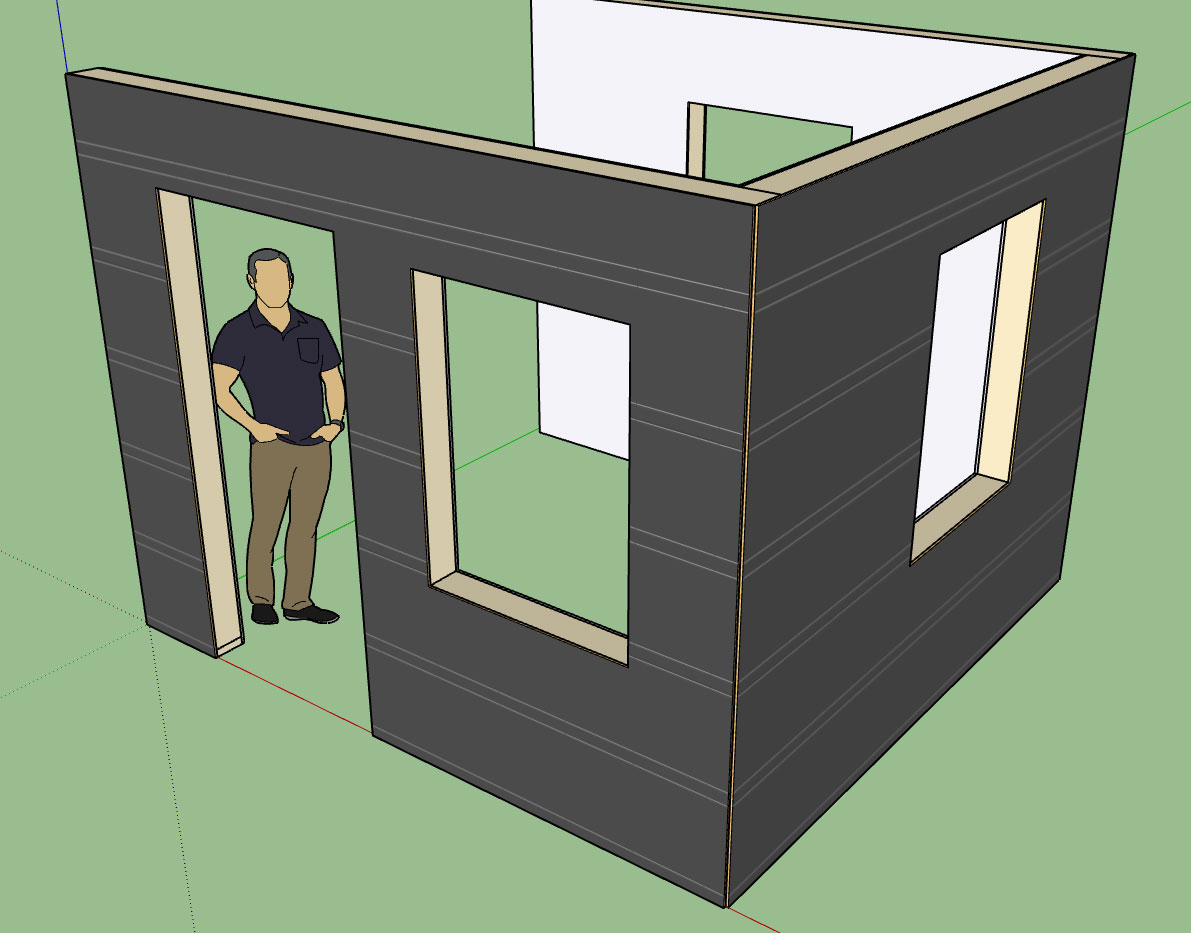
Felt + OSB is similar to Tyvek + OSB where the outer face of the OSB has the felt material applied.
The felt material application depicts a typical 36" roll with 2" of overlap.
The change to the way I'm handling the gypsum material is a significant upgrade and allows for usage of custom materials from the material library within the global settings.
-
OSB stands for oriented strand board.
The most common uses are as sheathing in walls, flooring, and roof decking
OSB is a material with favorable mechanical properties that make it particularly suitable for load-bearing applications in construction. It is now more popular than plywood, commanding 66% of the structural panel market. The most common uses are as sheathing in walls, flooring, and roof decking
Oriented strand board (OSB), also known as flakeboard, sterling board and aspenite in British English, is a type of engineered wood similar to particle board, formed by adding adhesives and then compressing layers of wood strands (flakes) in specific orientations.
-
In a high moisture climate (like on the beach here in Western Washington) I would recommend staying with plywood, but most new construction for walls is 7/16 OSB anymore.
-
The current Wall Plugin ToDo list as of 10/29/2018:
1.) Gable Walls (Standard and Shed) [in progress]
2.) Stair Module (straight run then landings and complex shapes) [in progress]
3.) Estimating [in progress]
4.) Adv. Gypsum (multi-layer gypsum both sides of int. walls)
5.) Custom width of king and trimmer studs for doors, windows and garage doors.
6.) Transom windows above doors (rectangle and arch)
7.) Additional door types (bifold, sliding glass, pocket doors)
8.) Join/Split Wall Tools
9.) Wall Stretch Tool
10.) Wall Grouping
11.) Wall Dropper
12.) Engineering
13.) Levels/Stories Manager
14.) Interior painting of gypsum
15.) Wall justification in draw wall tool.
16.) Gypsum backer studs at tee intersections
17.) Interior Trim (crown molding, baseboard, chair rails, wainscoting)
18.) Global Settings (8 new tabs) [in progress]
19.) Shear Wall ModuleSome of these are extremely high priority and some of these are much lower on the list.
-
Version 0.9.8j - 10.30.2018
- Advanced layers (headers, kings and trimmers) enabled for door, window and garage door framing.
Somehow along the way I setup advanced layers for the framing however they did not get fully implemented until now.
-
With balloon framed gable walls one often sees a lot of trapezoidal picture windows used in these walls:

I need a little more guidance on the most typical way these openings are framed out. If a header is installed it would have to be inclined and would follow the pitch of the roof.
Any framing details or suggestions would be greatly appreciated.
-
Version 0.9.9 - 10.30.2018
- Enabled custom window header and trimmer widths within draw and edit menus.
- Added king and trimmer width parameters to Windows tab of global settings.
- Fixed a bug with insulation positioned above windows where trimmer quantity is greater than one.
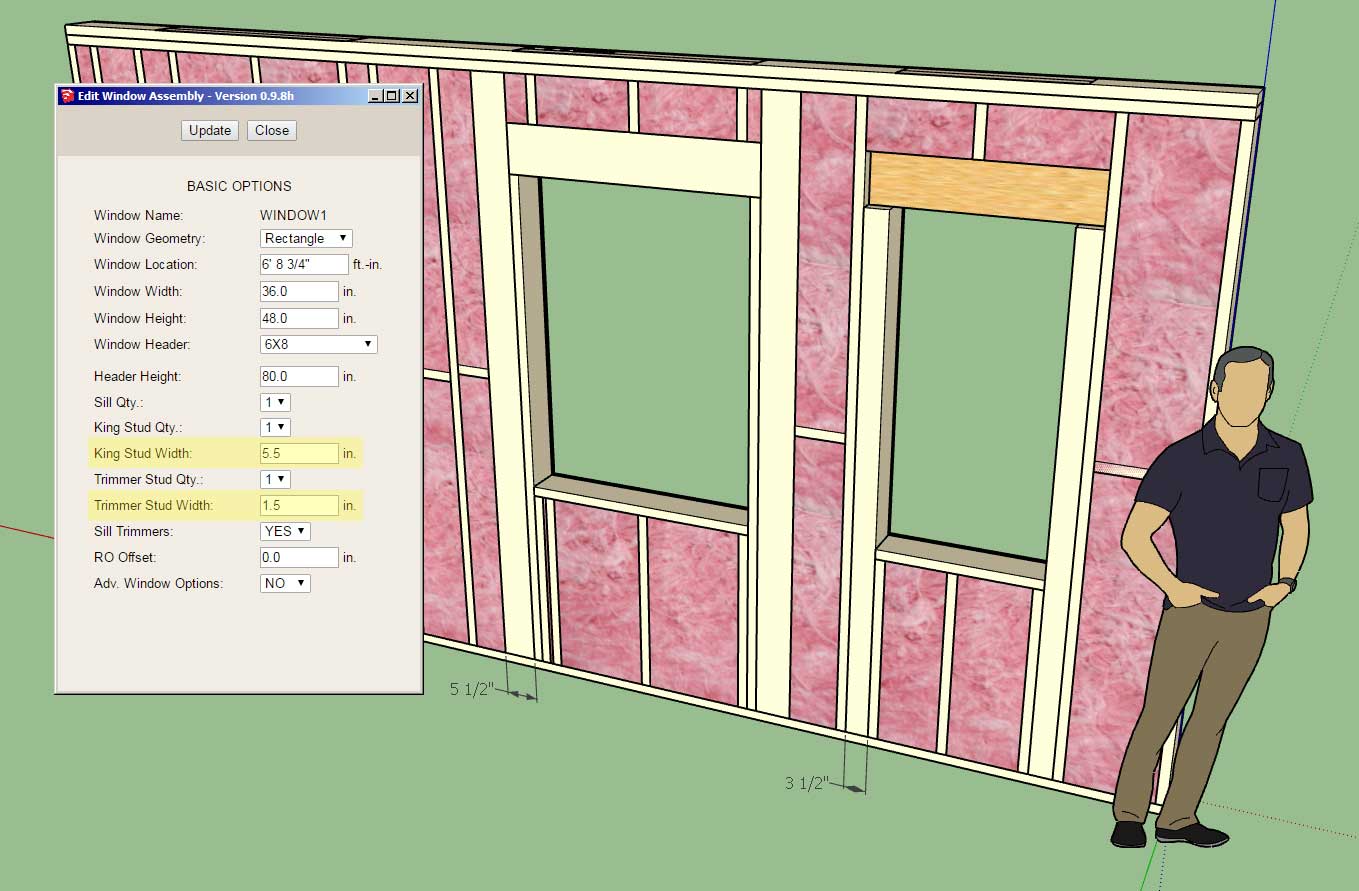
This addition was per customer request. I will probably add the same two additional parameters for doors and garage doors in the very near future.
-
On a somewhat related note to the last post I'm looking at various photos of typical residential framing and I've noticed that many framers will include a plate below or above the header or both:

Any thoughts on this?
Do I need to add this in as another option?
-
Sounds like I need to provide the option for a header top plate and header bottom plate, (not sure what the exact terminology for these plates should be).
-
Adding a top and bottom plate may be done when the beam is not available.
Although redundant it would allow the framer to allow for beams that are not on site
at the time the frame is being constructed. -
I can use either one parameter with four possible options or two parameters with two options each:
Built-up Header: NO|TOP|BTM|BOTH
or
Header Top Plate: YES|NO
Header Btm Plate: YES|NOWhich would you prefer?
-
Version 0.9.9b - 10.31.2018
- Enabled built-up headers within the window draw and edit menus: None, Top, Bottom or Both.
- Added the built-up header parameter to the Windows tab of the global settings.
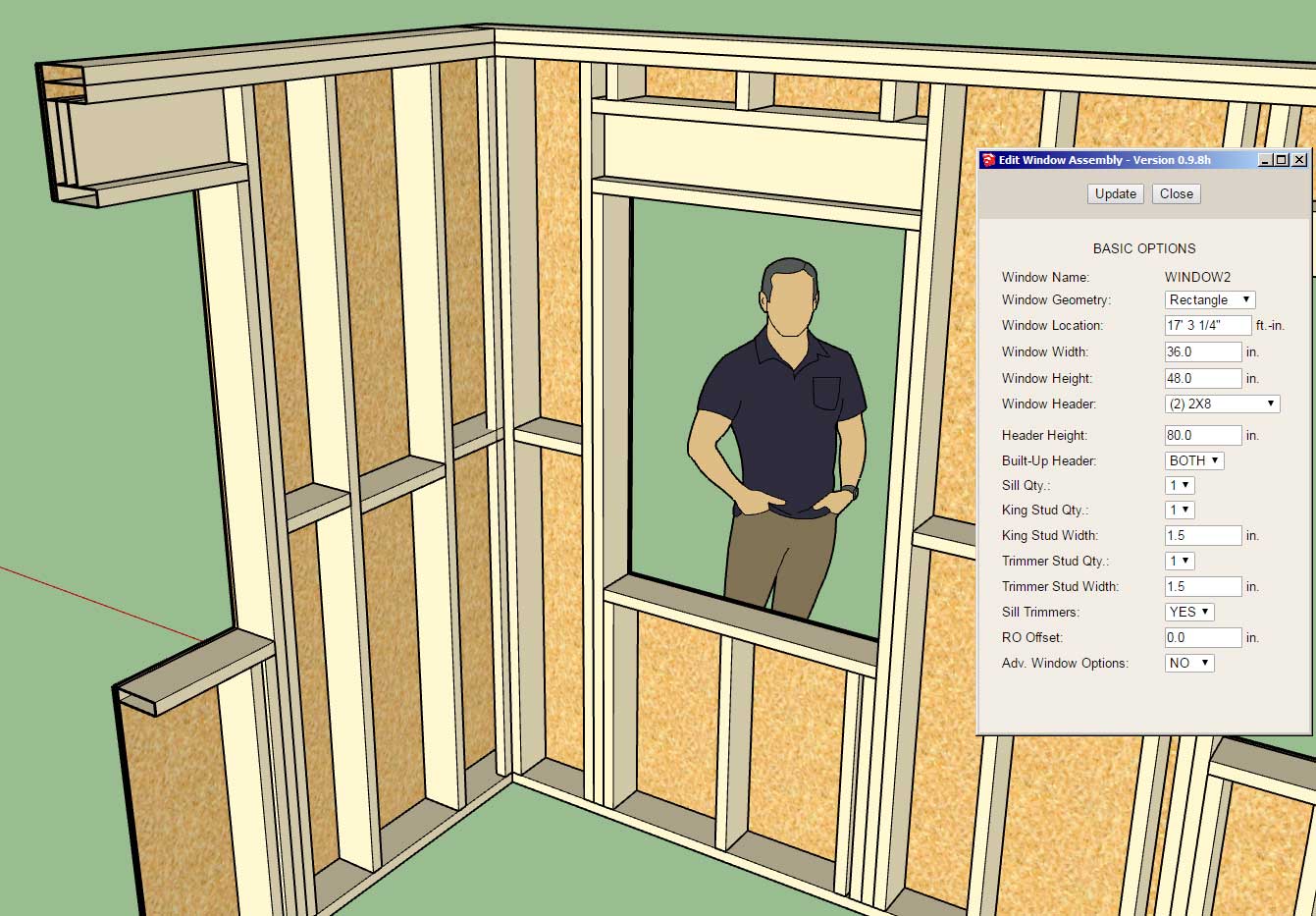
The window to the left is a good example for where the top plate is not needed, just the bottom plate. as the header butts up directly against the top plate of the wall.
The window to the right is set lower in the wall and requires both top and bottom plate as shown.
The built-up header parameter allows four options: None, Top, Bottom or both. The default behavior can also be set in the global settings.
As with the custom widths on the trimmers and kings I am test bedding this with the windows first, once everyone has had a chance to work this through a bit I will roll it out for doors and garage doors.
-
I'm trying to simulate a G-rib metal wall panel here (clay and stone color):
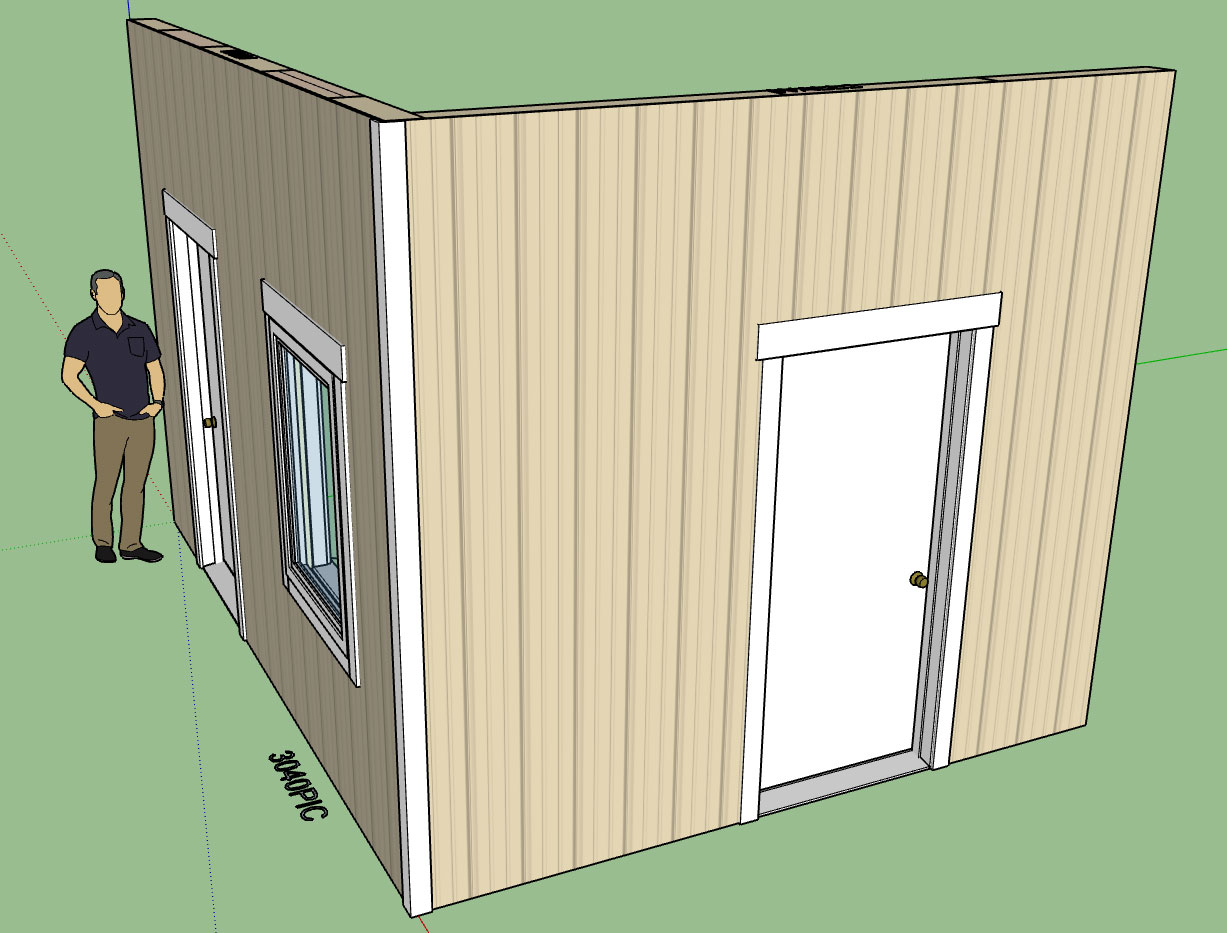
The problem of course is that the shadow will be cast a certain direction on the original texture/image but when you render it out the light source may be the opposing direction which will make things look a bit off.
Modeling the actual texture/profile of the panel is not a good idea either since it would make the model very heavy.
Thoughts?
View model here:
3D Warehouse
3D Warehouse is a website of searchable, pre-made 3D models that works seamlessly with SketchUp.
(3dwarehouse.sketchup.com)
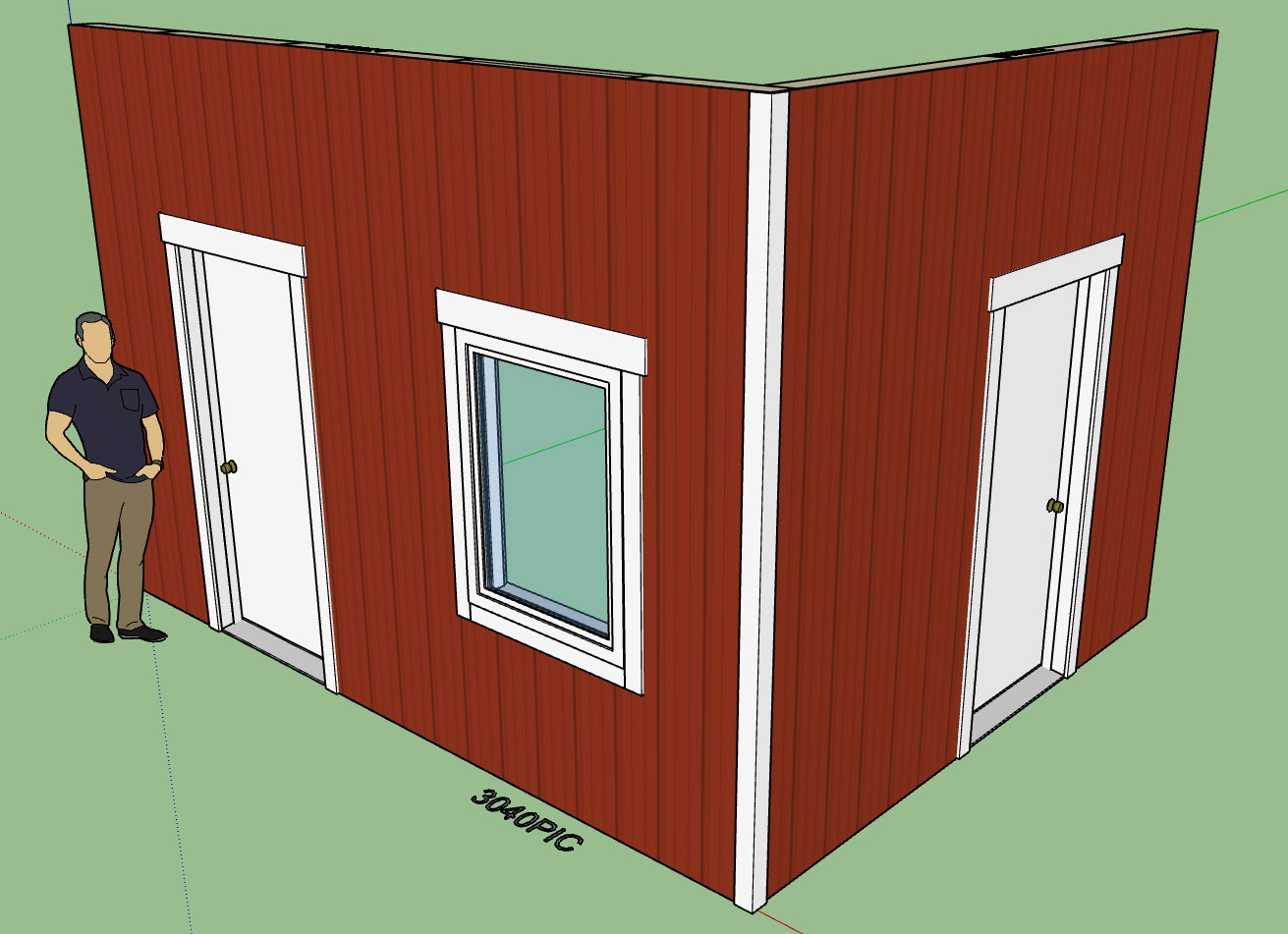
-
This is an example of metal roof and wall cladding (utilizing the Material Manager in both the Truss and Wall plugins):
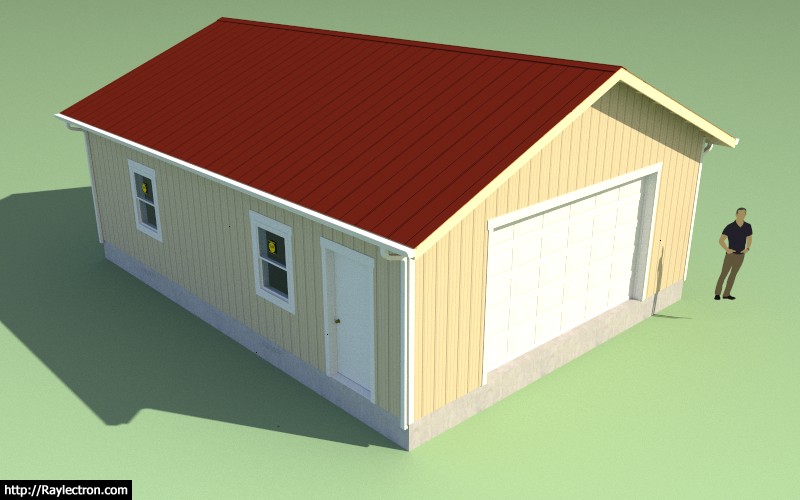
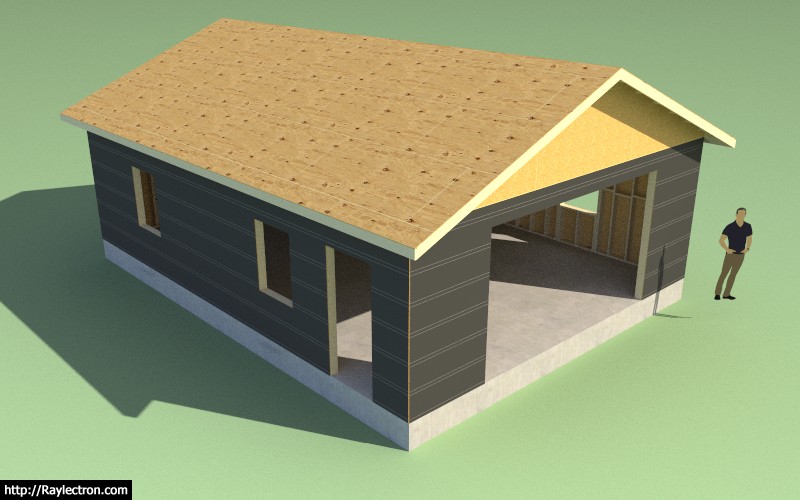
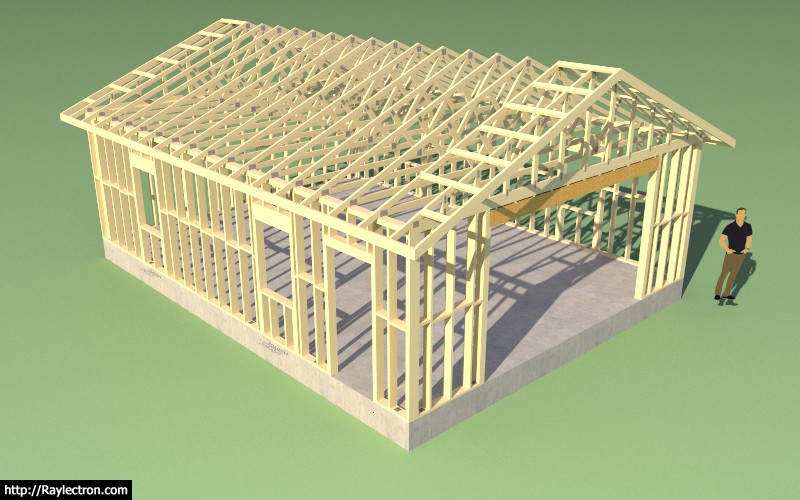
View model here:
3D Warehouse
3D Warehouse is a website of searchable, pre-made 3D models that works seamlessly with SketchUp.
(3dwarehouse.sketchup.com)
The model was created with all three plugins. The only manual edit was moving the person outside of the structure and re-positioning of two anchor bolts that landed in the middle of the garage door. The entire model except for the foundation (slab-on-grade) is fully parametric, moving openings or changing the roof pitch is a couple clicks of the mouse. Model creation time was about 10 minutes.
As far as speed of modeling goes I think this is starting to close in on other design packages like Revit and Chief Architect. Once I add the estimating and then the engineering it will even exceed their capabilities.
Advertisement








